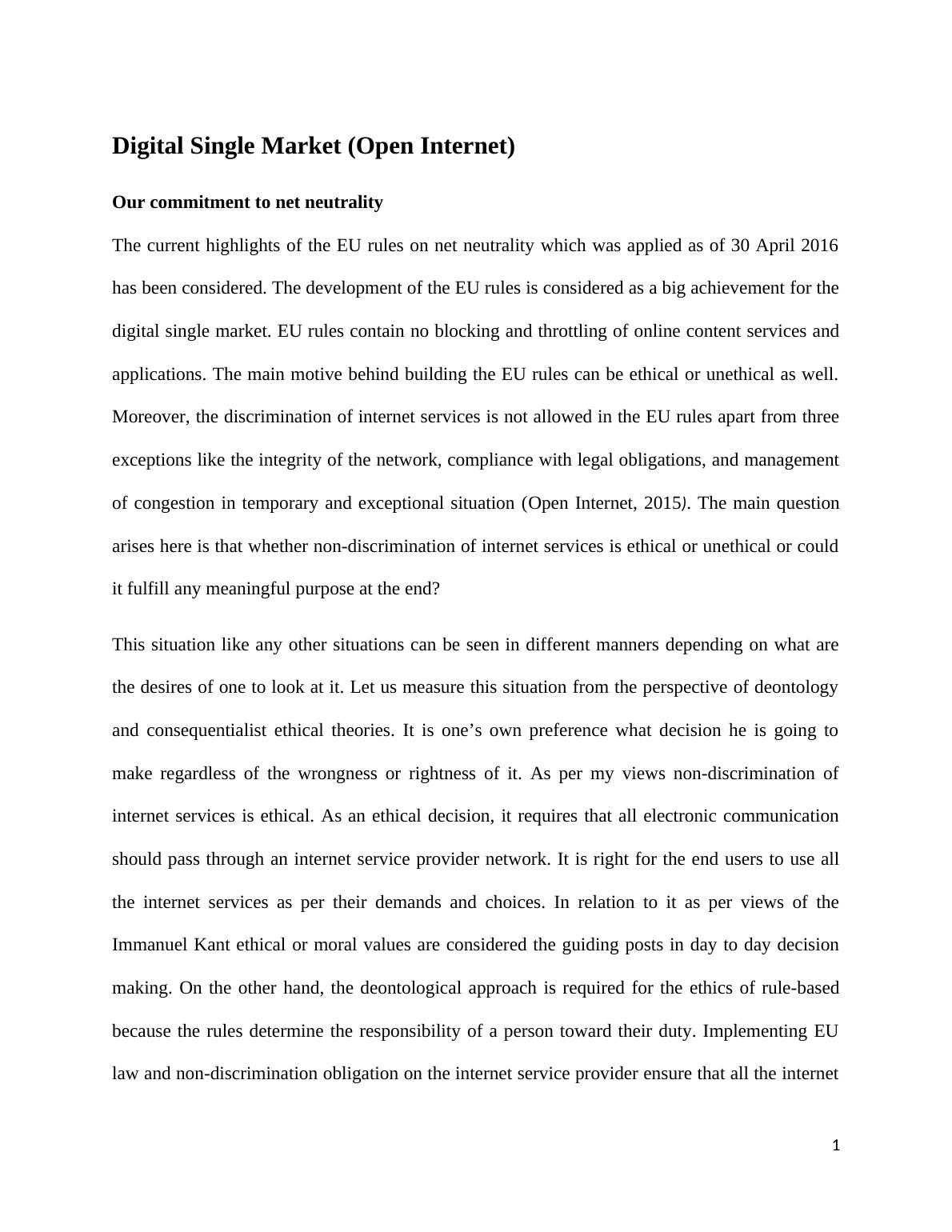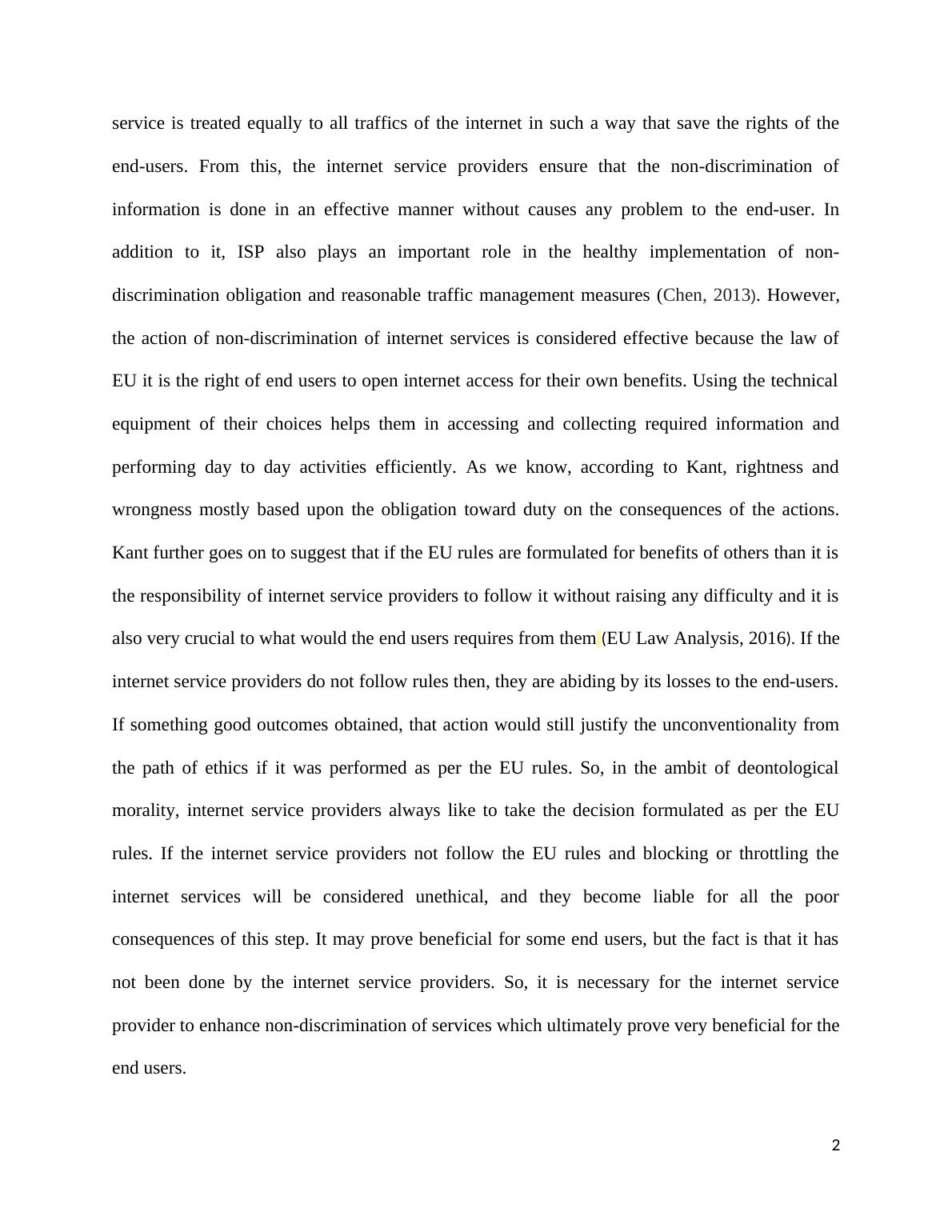Digital Single Market (Open Internet)
4 Pages1179 Words161 Views
Added on 2019-10-16
Digital Single Market (Open Internet)
Added on 2019-10-16
ShareRelated Documents
Digital Single Market (Open Internet)Our commitment to net neutralityThe current highlights of the EU rules on net neutrality which was applied as of 30 April 2016has been considered. The development of the EU rules is considered as a big achievement for thedigital single market. EU rules contain no blocking and throttling of online content services andapplications. The main motive behind building the EU rules can be ethical or unethical as well.Moreover, the discrimination of internet services is not allowed in the EU rules apart from threeexceptions like the integrity of the network, compliance with legal obligations, and managementof congestion in temporary and exceptional situation (Open Internet, 2015). The main questionarises here is that whether non-discrimination of internet services is ethical or unethical or couldit fulfill any meaningful purpose at the end?This situation like any other situations can be seen in different manners depending on what arethe desires of one to look at it. Let us measure this situation from the perspective of deontologyand consequentialist ethical theories. It is one’s own preference what decision he is going tomake regardless of the wrongness or rightness of it. As per my views non-discrimination ofinternet services is ethical. As an ethical decision, it requires that all electronic communicationshould pass through an internet service provider network. It is right for the end users to use allthe internet services as per their demands and choices. In relation to it as per views of theImmanuel Kant ethical or moral values are considered the guiding posts in day to day decisionmaking. On the other hand, the deontological approach is required for the ethics of rule-basedbecause the rules determine the responsibility of a person toward their duty. Implementing EUlaw and non-discrimination obligation on the internet service provider ensure that all the internet1

service is treated equally to all traffics of the internet in such a way that save the rights of theend-users. From this, the internet service providers ensure that the non-discrimination ofinformation is done in an effective manner without causes any problem to the end-user. Inaddition to it, ISP also plays an important role in the healthy implementation of non-discrimination obligation and reasonable traffic management measures (Chen, 2013). However,the action of non-discrimination of internet services is considered effective because the law ofEU it is the right of end users to open internet access for their own benefits. Using the technicalequipment of their choices helps them in accessing and collecting required information andperforming day to day activities efficiently. As we know, according to Kant, rightness andwrongness mostly based upon the obligation toward duty on the consequences of the actions.Kant further goes on to suggest that if the EU rules are formulated for benefits of others than it isthe responsibility of internet service providers to follow it without raising any difficulty and it isalso very crucial to what would the end users requires from them(EU Law Analysis, 2016). If theinternet service providers do not follow rules then, they are abiding by its losses to the end-users.If something good outcomes obtained, that action would still justify the unconventionality fromthe path of ethics if it was performed as per the EU rules. So, in the ambit of deontologicalmorality, internet service providers always like to take the decision formulated as per the EUrules. If the internet service providers not follow the EU rules and blocking or throttling theinternet services will be considered unethical, and they become liable for all the poorconsequences of this step. It may prove beneficial for some end users, but the fact is that it hasnot been done by the internet service providers. So, it is necessary for the internet serviceprovider to enhance non-discrimination of services which ultimately prove very beneficial for theend users.2

End of preview
Want to access all the pages? Upload your documents or become a member.
Related Documents
ITC 506 - Information Technology Ethics : Open internetlg...
|10
|1685
|148
Open Internet Regulation Assignment PDFlg...
|6
|2437
|113
Commitment to Net Neutrality Assignmentlg...
|7
|2187
|128
Assignment Information Technology Ethicslg...
|9
|1616
|36
Assignment Our Commitment to Net Neutralitylg...
|6
|1990
|73
Open Internet Net Neutrality Assignment 3 Name of the Student (SID of the Student)lg...
|10
|1848
|475
